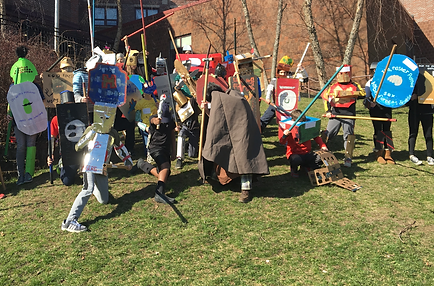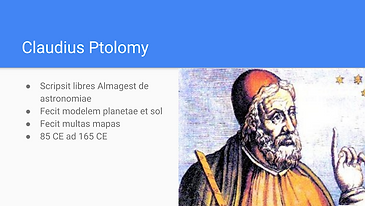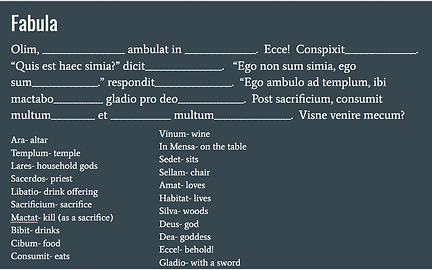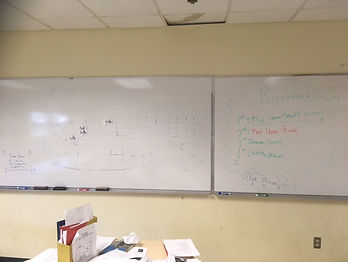top of page

David Parkinson
Latin and Classical Civilization Teacher
Lessons and Student Work
Throughout my practicum teaching I have had a number of unit projects and regular activities to promote learning. This page highlights some of the work done in my class with explanations of how each activity functions and the pedagogy behind them.
Gladiator Project
Art and Architecture Project
TPRS Story Activity
Vocabulary Games
Classroom Economy
Alexandria Culture Presentations
As part of project based learning (see here for the handout), students were asked to create models of temples or art dedicated to a specific Roman god. In the process they learned about the defining architectural features of ancient religious structures and art. They were then asked to analyze the social context of the myth depicted in their art or on their temple and present on why it was there, who it was for, and what its message/function in society was. This was designed to expand the students understanding of religion in Roman times and to foster critical analysis of the didactic and performative nature of structures in the ancient world.
In order to bring the ancient world to life, I stage a number of role-playing activities- the most dramatic of which is a set of gladiator games (see the full description here). Not only does it allow students to do in depth research about practice, ritual, and armor in context, it gives them a chance to speak, cheer and taunt in Latin!
As part of the story in the Cambridge Latin series, two characters visit Alexandria, Egypt. This provided a great opportunity for my students to do research and presentations on Hellenistic culture in the Roman empire. Not only did this give students a chance to learn more about diverse cultures and cultural diffusion in the ancient world but it put the language in context by giving students a chance to present part of research in Latin! Click here for the slides from a presentation of the "Innovations of Alexandria" here for the "Ptomelaic Dynasty" or here for the "Districts of Alexandria".
To increase student interest and involvement, while helping scaffold students produce sentences in Latin, I use Total Physical Response Storytelling activities. These provide a framework of a story in the target language with gaps for the students to fill with words of their choice. What is created is often done entirely in Latin with the story being acted or drawn out as it progresses for full immersion. The result is often zany and sometimes bizarre but it allows students to target specific forms with high repetition and (once a word has been used in an amusing story) the students rarely forget it!
Because social learning is an important part of education, I try to "gamify" vocabulary acquisition. While games on Quizlet and Kahoot! are fun and useful, among the most popular games I play is called "bluff" in which students divide in to two teams and member of the team being asked to define a word stand up if they know the word or want to bluff knowing it. If the opposing team calls on someone who knows the word, that team gets as many points as people are standing- if they don't then the opposing team gets the points. Rivalry gets fierce and students regularly ask to play the game. Furthermore, it is highly adaptable to any type of question or translation-based activity. To keep score, I will often a Roman circus on the board and have game pieces race around, adding different incentives for reaching certain points first.
Since I believe incentives are more effective in generating interest than the treat of punishment, I have installed a classroom economy system which not only motivates students to performance but also reduces need the for corrective measures. In theory similar to Classdojo (and adapted from this program), the system works on tokens which are given out to students for positive performance in class or extra work out side of class, these tokens, in turn can be turned in for extra credit and other benefits. For example, students who do their homework, provide answers in class, perform well in classroom activities, or do other work such as creating study guides or doing supplementary Latin composition are awarded with tokens. In addition, students can hold positions in class to be paid a wage in tokens. This system is effective for students who are looking for an edge on their grades, are socially competitive, and most importantly those who feel overwhelmed by larger classroom expectations. For a student who is anxious about being able to perform on tests, earning tokens builds their confidence by showing that they can accomplish and are rewarded for achieving small goals.










Contact Information
Contact Information
I am available at lunch time and after school. Outside of school hours you can reach me via email.
Email: cparkinson@arlington.k12.ma.us
Miss Holt's Contact
Email: aholt@arlington.k12.ma.us
What to expect
bottom of page